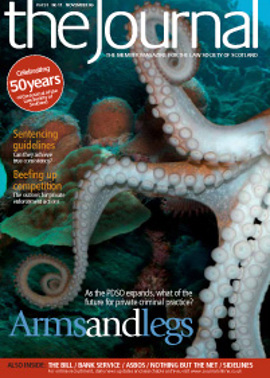ASBO, the young misfit

This article aims to highlight the experience of the local authority solicitor in relation to the use of juvenile antisocial behaviour orders (ASBOs). Difficulties arise from disparities between the way the legislation is perceived, how it is being implemented and, ultimately, the position of the solicitor.
There is a general misconception that antisocial behaviour legislation in Scotland was intended for use as a means of tackling youth crime. The first such legislation was introduced in the Crime and Disorder Act 1998. However, whereas in England and Wales the legislation primarily focused on tackling antisocial behaviour by young people, in Scotland it was used mainly for tackling neighbour disputes in social housing areas and the Act did not extend to obtaining ASBOs against 12 to 15 year olds.
In 2003, there was a shift of focus in Scotland when the consultation: Putting Communities First: A Strategy for Tackling Antisocial Behaviour proposed extending the legislation to this age group. Although the report following the analysis of responses (“the report”) detailed concerns about the disproportionate targeting of 12 to 15 year olds and that the young person’s definition of antisocial behaviour differed from that of an older person, the Antisocial Behaviour etc (Scotland) Act 2004 was passed, bringing Scotland into line with England and Wales. By s 4, local authorities were given extra powers in order that ASBOs could be sought against a child aged 12 to 15 (the “juvenile ASBO”).
Youth justice and the ASBO
Section 4 came into force on 28 October 2004. Two years on, it would seem that the youth justice system of Scotland, which differs considerably from that of England and Wales, has not yet embraced the juvenile ASBO. As appears from the report, from the outset it was considered a last resort, and it would seem, with no full ASBO having yet been granted in relation to a 12 to 15 year old, that it has remained this way. The Executive’s Guidance on the Use of Antisocial Behaviour Orders states that the children’s hearings system is the primary forum for dealing with antisocial behaviour and offending by under 16s. And as far as justice is concerned, the tradition of the more informal hearings system has prevailed over use of the 2004 Act.
There is resistance in Scotland to the idea that people in this age group should be dealt with in court. To an extent this may be reflected in the fact that should an ASBO be breached, the legislation provides that the young person simply be referred back to the hearings system. In this sense, the hearings system is regarded as above the local authority in relation to offending by young people, and more appropriate than the courtroom. This is a vicious cycle as the young person who is the subject of an ASBO will already have been dealt with by the children’s hearings system. The local authority solicitor may view the seeking of an ASBO as reflecting the failure of children’s hearings to deal with offensive behaviour, yet view the hearings as having the power to frustrate the opportunity to try a preventative order that might just work.
The ABC of tackling behaviour
In fact from the local authority solicitor’s point of view, the acceptable behaviour contract (ABC), which has proven successful, has been far more prominent in tackling antisocial behaviour by this age group. The ABC is a voluntary agreement that is entered into by the person behaving antisocially and one of the local authority agencies involved in preventing antisocial behaviour. It does not require the same level of liaison between local authority services, nor does it have the status of being used as a last resort. It does not require a court appearance and can be used even though the young person is not being dealt with by the children’s hearings system. This type of contract offers flexibility and, although it does not have the status of a court order, its legal standing is enhanced as it is issued by officials in the presence of those responsible for the young person. The statistics resonate the accessibility of the agreements as 242 ABCs were negotiated in relation to under 16s in the period 2004-05 compared with the granting of three interim ASBOs.
It can be argued that the extension of the ASBO legislation has put local authority solicitors at the proverbial rough end of the stick. Not only is the solicitor dealing with misconceptions of the general public that ASBOs are an available redress for youth crime, he/she is also a key actor involved in making decisions regarding an order affecting a child’s future. This involvement is likely to begin many months before the decision is taken to seek a juvenile ASBO, through attending meetings with the police, registered social landlords (“RSLs”), children’s hearings, education services and social services to discuss the behaviour of the young person. The solicitor is not the decision-maker. He/she plays a role in the process by listening to debates and clarifying disputes, but will only act on the instructions of the chief executive. The role is essential, as someone has to be able to identify legal issues and conflicts, especially as some government agencies strongly resist the ASBO as they view it as the system failing the child. Yet as the solicitor is not an expert in child welfare, his or her opinion may be regarded by some as superfluous.
Competing agendas
Antisocial behaviour is broadly defined in s 143 of the Act (see panel).
Implicit in this definition is that the subjective view of the individual complaining is what counts when the behaviour of a 12 to 15 year old is being considered. For example, some members of the public regard young persons hanging around on street corners as antisocial behaviour, whereas others would only regard this as antisocial if there was loud abusive language and public drinking involved. The local authority solicitor is not only being put in the position of determining the behaviour to be included in the application for an ASBO; they also are aware that they will become the public face of the ASBO when court proceedings commence. Proceedings for a juvenile ASBO are in private, but the reality of media attention is very public.
There are, in general, a higher number of complaints of antisocial behaviour than might have been anticipated by local authorities, due to government advertisements and the extensive media attention afforded to disturbances caused by young people. It is curious that if the person complaining were asked for an estimate as to how many full ASBOs had been obtained against 12 to 15 year olds in Scotland, it is most unlikely they would reply “none” and they would be taken aback to learn that to date, there have only been four interim juvenile ASBOs granted. The main reason these have not proceeded to a full ASBO is because the only benefit is that a full ASBO can affect the tenancy of the young person’s parents, allowing the RSL or local authority to seek eviction proceedings. The threat of eviction is likely to exacerbate the problem rather than solve matters, given the further adverse effect on those living with the young person, and because in the event of eviction the local authority simply becomes responsible for rehousing the family elsewhere.
In addition to playing a role in obtaining acceptable behaviour contracts and considering subjective complaints of antisocial behaviour by members of the public, when monitoring a case of difficult youth behaviour the local authority solicitor balances the competing pressures of communities requiring protection from antisocial behaviour and officials resisting the use of court orders. Furthermore, in the unlikely event that the local authority does instruct them to obtain an interim juvenile ASBO, they may then find themselves faced with accusations from other agencies involved with the young person that the decision was politically motivated – an impossibility given the hurdles that have to be overcome to get to the stage of seeking the ASBO, and the limited value of obtaining the ASBO where on a breach of the order the young person is simply referred back to the children’s hearings system.
A paper exercise?
At present, it would seem the extension of ASBO legislation to 12 to 15 year olds has been a pointless exercise if the youth justice system has no intentions of embracing the ASBO, as the order can never be fully tested as an effective method of preventing antisocial behaviour. The tradition of the Scottish youth justice system means that the English experience of juvenile ASBOs cannot be relied upon in judging their value. A true measure of the effectiveness of the ASBO could only be achieved by removing the legislative requirement that the 12 to 15 year old breaching an ASBO be referred back to children’s hearings. By amending the legislation in this way the status of the order would be enhanced, which, in turn, would make it worth the valuable resources at present consumed by its mere consideration.
In short, for the local authority solicitor, the extra powers granted, in their present state, are impracticable because they are frustrated by politics and procedure, and the solicitor receives no praise for their role in the use of acceptable behaviour contracts. In this respect the key role of the local authority solicitor in balancing the needs of communities with the needs of a 12 to 15 year old accused of antisocial behaviour is underrated and misunderstood. This leads the author to conclude that the extension of the legislation can only be viewed as a mere political paper exercise that appeals to people wishing to complain about antisocial behaviour, not a worthy addition to the Scottish legal system that can be utilised properly by local authorities in the interests of the child.
Carla Towns works for a private practice and is currently carrying out research among local authority solicitors regarding the administration and effects of the juvenile ASBO.THE ESSENCE OF THE ASBO
By s 4 of the 2004 Act, on the application of a relevant authority, the sheriff may make an ASBO if satisfied that the person named in the application (a) is at least 12 years of age; (b) has engaged in antisocial behaviour towards a relevant person; and (c) that an ASBO is necessary for protection against further antisocial behaviour by that specified person.
Where the specified person is a child, the sheriff shall first require a children’s hearing to be arranged to obtain its advice as to whether condition (c) is met.
By ss 9 and 10, breach of an order is an offence, but in the case of a child is not to result in detention.
Antisocial behaviour is defined by
s 143 as occurring where a person “(a) acts in a manner that causes or is likely to cause distress; or (b) pursues a course of conduct that causes or is likely to cause alarm or distress, to at least one person who is not of the same household”.
In this issue
- Home and away
- The importance of kinship care
- Growing arms and legs
- Changing its spots?
- Guiding hand
- Trustbusters unite
- Closing the books
- Spam: the managed solution
- Nothing like Nothing but the Net!
- Banking on service
- You want certified?
- Enough is enough
- Provision and prejudice
- Work and families
- Cash trapped
- Man of business
- Scottish Solicitors' Discipline Tribunal
- Website reviews
- Book reviews
- Sale questionnaire to be tested
- So long, and thanks for all the fizz
- ASBO, the young misfit






